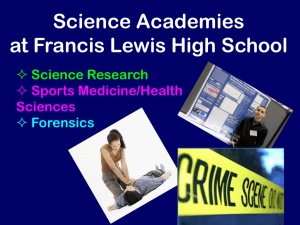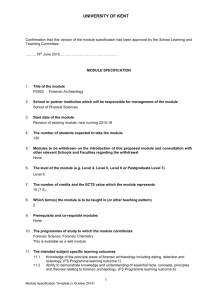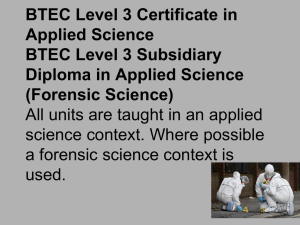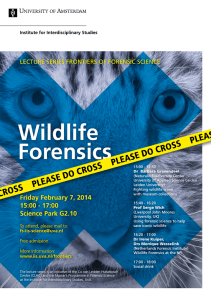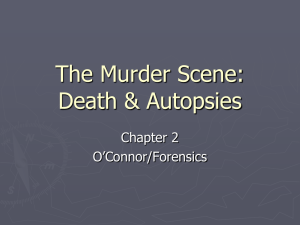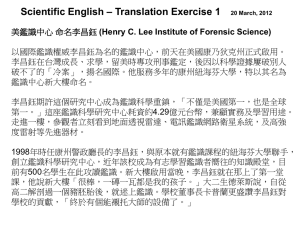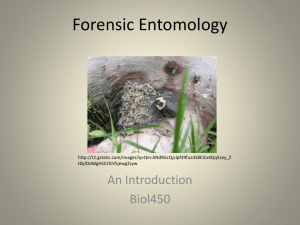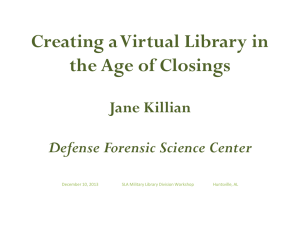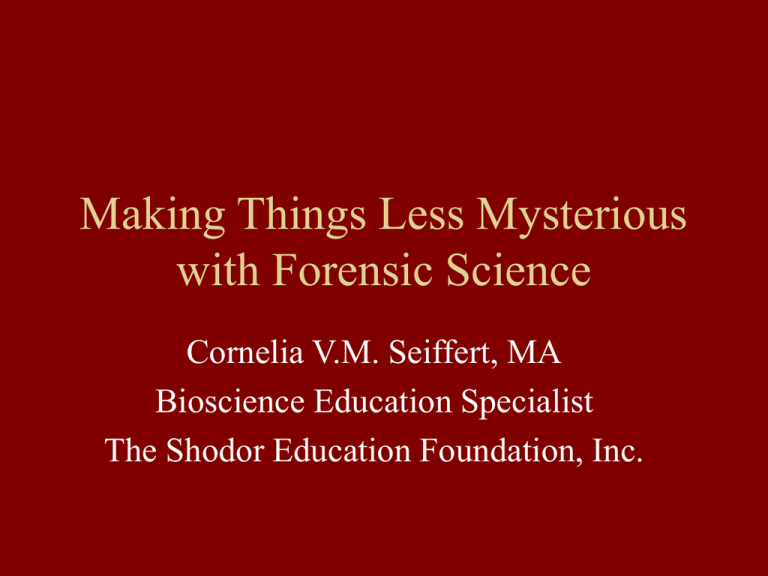
Making Things Less Mysterious
with Forensic Science
Cornelia V.M. Seiffert, MA
Bioscience Education Specialist
The Shodor Education Foundation, Inc.
Making Things Less Mysterious
with Forensic Science
Kent Robertson
Matt Lathrop
What is forensic science?
•Forensic science - relating to the use of science or
technology in the investigation and establishment of facts or
evidence in a court of law.
•Computational science - useful to forensic scientists
because it allows them to view evidence with greater clarity,
to simulate specific events and to save time by automating
tedious processes.
•For more information, see:
http://www.shodor.org/succeed/forensic
Careers in Forensic Science
•
•
•
•
•
•
•
Crime scene investigation
Forensic entomology
Facial reconstruction
Forensic osteology
Cryptography
Questioned document analysis
Forensic pathology
Crime Scene Investigation (CSI)
• Practitioners of CSI
gather all evidence
relevant to a crime
that has taken place.
• Extreme attention to
detail is necessary.
• The ability to
recognize patterns
that others may not
notice makes for a
good crime scene
investigator.
Forensic Entomology
• The study of the life
cycles of various
insects in order to
understand the timing
of criminal activities
such as homicide.
• Practitioners have a
great deal of
familiarity with
insect taxonomy and
ontogeny.
http://folk.uio.no/mostarke/forens_ent/forensic_entomology.html
Facial Reconstruction
• Using their in-depth
understanding of
human anatomy and
osteology, scientists
reconstruct the faces
of homicide victims
based on the
morphology of skulls
found at crime scenes.
FACES web site http://www.faceslab.lsu.edu
Forensic Osteology
• Investigators use their knowledge of human
bony anatomy to determine the biological
sex, possible ethnicity, age at death,
possible causes of death, and height of
individuals based on their skeletal remains.
http://www.eskeletons.org
Cryptography
• The process or skill of communicating in or
deciphering secret writings or ciphers.
Cryptographers are often aided in their
work by computer programs.
http://www.shodor.org/succeed/forensic/codes.html
Questioned Document Analysis
(QDA)
• QDA is carried out by handwriting experts - those
that are trained to determine whether handwriting
is real or forged. These analysts (like many
specialists in forensic science) are often called
upon to testify in court.
http://www.bham.ac.uk/english/bibliography/handwriting/
new_web_pages/UKhw.htm
Questioned document analysts CANNOT
determine which attributes of the writer?
Gender
Age
Handedness
Source © Emily Will (Questioned Document Examiner)
http://www.qdewill.com
Forensic Pathology
• The forensic
pathologist performs
autopsies to
determine the cause
and manner of death
in situations falling
under the jurisdiction
of the local medical
examiner or coroner.
*Image source - http://www.phobe.com/furby
The body farm Death's acre
Glossary
• cryptography - the process or skill of
communicating in or deciphering secret writings
or ciphers
• entomology - the scientific study of insects
• morphology - the branch of biology that deals
with the form and structure of organisms without
consideration of function
• ontogeny - the origin and development of an
individual organism from embryo to adult, also
called ontogenesis
• osteology - the branch of anatomy that deals with
the structure and function of bones
Glossary (cont.)
• pathology - the scientific study of the nature
of disease and its causes, processes,
development, and consequences. Also
called pathobiology.
• taxonomy - the classification of organisms
in an ordered system that indicates natural
relationships

